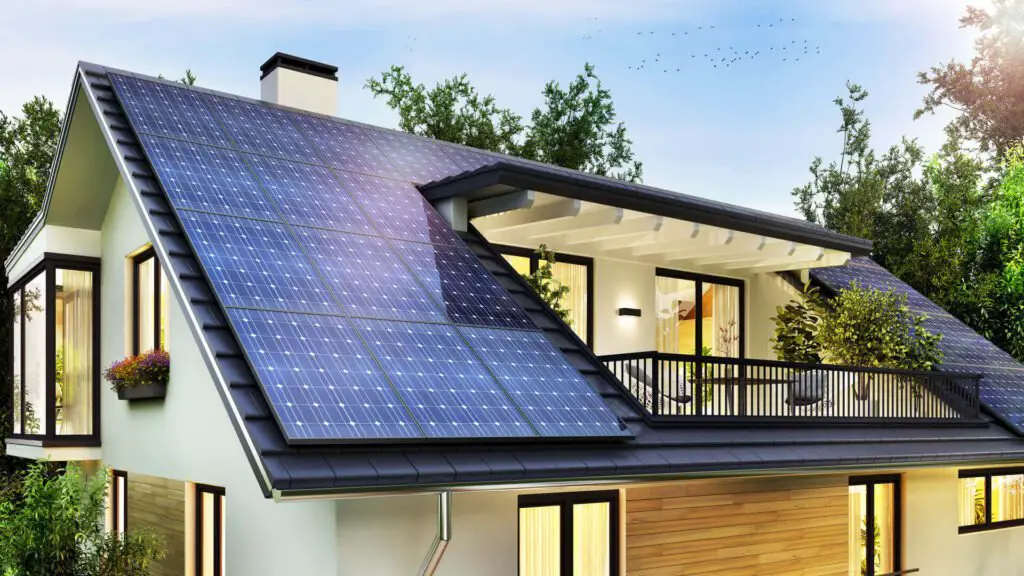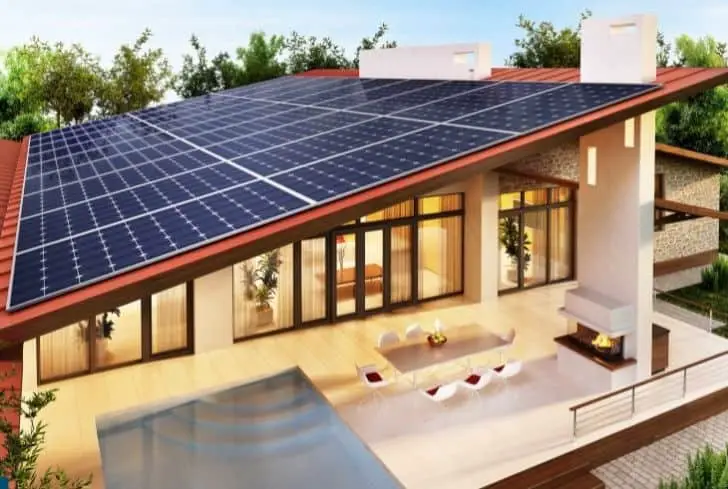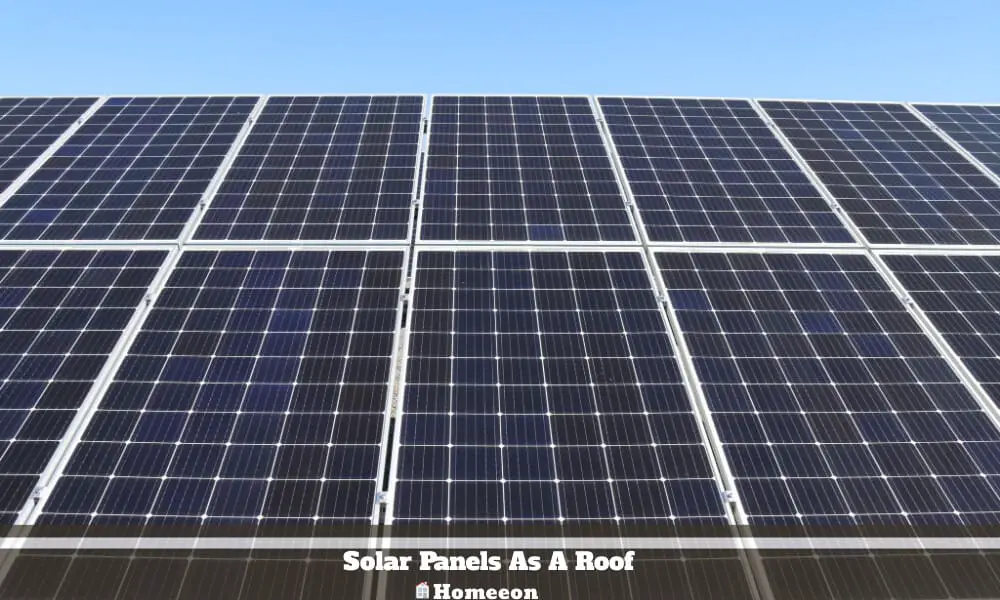Last Updated on August 1, 2023 By Emma W. Thomas
Having solar panels as a roof is beneficial due to clean energy production, cost savings on electricity bills, reduced carbon footprint, and increased property value. It offers an eco-friendly and sustainable solution to harness the sun’s power for residential and commercial spaces.
Pros & Cons of Solar Panels for a Home Roof
| Pros | Cons |
|---|---|
| 1. Environmental Impact: Solar panels generate clean, renewable energy, reducing reliance on fossil fuels and minimizing carbon footprint. | 1. High Initial Cost: The upfront cost of acquiring and installing solar panels can be significant, often requiring substantial investment. |
| 2. Reduced Electricity Bills: Over time, solar panels can significantly decrease electricity bills, creating long-term savings. | 2. Dependent on Weather: Solar energy production can vary based on weather conditions, especially in areas with less consistent sunlight. |
| 3. Low Maintenance: Once installed, solar panels require relatively little maintenance. | 3. Space Requirements: Adequate roof space and proper orientation are required to install solar panels, which may not be feasible for all homes. |
| 4. Increases Home Value: According to several studies, homes equipped with solar power systems have higher property values. | 4. Obsolescence Risk: Rapid advancements in solar technology may render older systems obsolete before they have fully paid for themselves. |
| 5. Consistent Energy Production: Solar panels can provide consistent, predictable energy production, reducing dependence on grid electricity. | 5. Difficulty in Moving: Removing and reinstalling solar panels during relocation can be complex and costly. |
| 6. Incentives and Tax Benefits: Governments and utility companies often offer incentives and tax credits for solar panel installations. | 6. Aesthetic Considerations: Some homeowners may find the appearance of solar panels on their roof undesirable. |
What Are The Benefits Of Solar Panels As A Roof?

Using solar panels as the roof is known as a roof-integrated solar system. An integrated solar roof is better looking and less cumbersome to install than rack-mounted solar panels. They come with many benefits to homeowners, which include;
Reduced Energy Bills
Lower energy bills are not only advantages of an integrated solar roof but for all solar system types. Solar roofs greatly reduce your utility bills by using energy from the sun instead of pulling it from the normal grid. You can also earn from solar by selling the excess energy from the solar to the grid. Additionally, some states offer tax credits to homeowners who use solar panels.
Others offer rebates to qualified homeowners and tax exemptions for upgrading solar panels from property taxes. Therefore, you do not pay property tax for the upgraded solar panels; hence a few bucks are saved.
Reduced Negative Environmental Impact
Solar energy is among the cleanest form of energy. Other electrical sources usually come from using fossil fuels that produce harmful gases when burned. Homeowners using solar energy have little or no dependency on fossil fuels hence lowering the carbon footprint. Additionally, it requires very little water for maintenance, unlike the water plants, which mostly require even 20 times more. They also do not produce any greenhouse gas or water pollution, making them a perfect option for the electrical energy source.
Lower Profile
Normal roofing constitutes about 40% of an exterior elevation that is visible. Having an integrated solar roof can enhance the look and feel of your home roofing instead of using the normal run-down roof with bulky solar panels. It also enables you to provide your home with the ability to gunner energy-efficient benefits while still maintain an aesthetic view of your roof. The integrated solar panel roofs are strategically designed to directly fit onto the roof’s shingles such that you cannot notice them from the ground.
Seamless And Easy Installation
Installing the integrated solar panel roof is easy, and it helps you receive efficient energy while still maintaining your roof’s structural integrity. The normal solar panels are tedious as they require a lot of drilling fasteners onto the roof surfaces to position their mounts. On the other hand, the integrated solar panel roof fastens directly onto the decks of the roof without the need to drill them into the rafters. They tend to have seamless interlocking features that allow them to integrate with the rest of the roof.
Pest Protection
Ordinary mounted solar panels allow room for pests to crawl around and hide. Some bird species even build their nests under the mounted solar panels. When using solar panels as roofs, there is no room for any burrowing animal or pest to roam around. The main benefit here is that pests are eliminated as they have no hiding or living spaces. Pests and other burrowing animals can threaten solar panels as they could damage them, and repairs are very expensive.
Additionally, the higher the number of birds and pets move under the panels, the airflow will be less causing it to overheat. An overheated solar panel has a reduced energy yield. You need not worry about these with the integrated solar panels, as they directly connect with the roof.
Increased Protection From Moisture
An integrated solar panel system provides a better roofing solution than ordinary solar panels. They tend to offer extra protection from any form of moisture from the environment by preventing water penetration as they flash with the roof. They also tend to have few or no possible water penetration as they have fewer holes resulting from drilling during their installation.
Increased Home Value
Most home buyers and real estate agents recognize the value that comes with integrated solar panel systems. The fact that they avoid your home roof from becoming an eyesore makes them an even bigger investment than normal solar panels, especially for people who are into roof designs and aesthetics.
Is Using Solar Panels As A Roof Worth It?
In-roof solar panels are almost similar to traditional solar panels, only that they are integrated with the roof. They are mostly used by replacing a section of the roof of a building without any tiles underneath. These panels are usually strong and waterproof, making them better than normal roofing tiles. They also have photovoltaic cells, which they use to generate electricity for use in your home.
Generally, the cost of an integrated solar system is comparable to the traditional solar panel, although the exact estimation is difficult since many factors are considered. For instance, the amount of energy the panels must generate, whether it is a new build or retrofit, the brand, and manufacturer prices. All installations are unique, so it is difficult for manufacturers to put prices on each. However, IKEA sells their Solar Century Built-in Plus at £5,250.
More popular integrated systems are cheaper and affordable which is incomparable to when they were first introduced. Their installation costs have greatly reduced with more manufacturers getting in the market, making it competitive. Their lightweight, restricted planning permits and aesthetics make them very worth it to have them installed in your home and even on your business premises. While installation costs can be high initially, the amount of money you save in the long run makes integrated solar systems worthwhile.
What Are The Cons Of Using Solar Panels As Your Roof?
While there are many monetary and environmental benefits associated with the integrated solar system, there are also some disadvantages that include;
High Costs
Having solar energy in your home will reduce energy bills in your home. However, having an integrated solar system is not as easily affordable as normal solar panels. They also require a lot of labor, especially if their installation is on a pre-existing roof. It will need to be partially pulled out to install the solar panel roof, making the installation process tedious and costly.
Unlike the usual electricity generated from fossil fuels or water plants, solar energy depends on the weather. Although they will generate electricity on cloudy and snowy days, their maximum benefits are attained on sunny days.
General Appearance
Integrated solar panels have an almost similar look since there are no varieties of designs and colors. For this reason, they tend to be so common, especially when used in the same neighborhood. Most of them are sleek and black and are therefore unsuitable for people who like unique features and finishing in their roofs.
Do Solar Panels Affect Your Roof?
Solar panels are not bad for the roof, but installing them could cause some minor damages. Installing the conventional solar panels involves bolting them to the roof; hence holes are made on the roof, driven directly into the ceiling or the attic. Such holes can easily lead to roof leaks in the long run.
In other cases, it could be as bad as causing mold growth, especially when the leaks go unnoticed, leading to a collection of moisture. Such situations also lead to shingles and roof tiles getting damaged since hammering and drilling are guaranteed in traditional solar panel installation.
You can opt for solar stacks, which help to avoid potential damage to the roof. Solar stacks are a unique and innovative way of mounting solar panels on the roof without drilling. Instead, you use a Miami-Dade County building code which is adhesive and has been approved. These stacks also help you to retain your roofing warranty and eliminate any potential disastrous roof penetrations. They are not difficult to install and do not require any penetrations, anchor points, or structural points for connections and they save you on installation labor costs and time.
Do Integrated Solar Panels Void Your Roof Warranty?

Most roofers advise that you avoid installing traditional solar panels in old roofs with less than ten years of life left. Instead, the best time is when the roof is new and strong. Whether solar panels installation will void your roofing warranty depends on the method used. Integrated solar panels do not potentially cause damage to the roof, unlike the traditional method, which involves drilling. For this reason, an integrated solar system will, in most cases, not void your roofing warranty.
Conclusion
Using solar panels as a roof to your home is a very good option as solar energy is among the cleanest source of energy that exists. It will also save you a lot of money, especially on electricity bills, which have become very expensive in recent times. It is also environmentally friendly as it does not involve any greenhouse gas emissions. On top of this, it also creates a great and unique finish to your house, which is not easily noticed from the ground.
References:
https://thriftenergy.co.uk/blog/6-benefits-of-having-solar-pv-installed-on-your-roof/
https://blog.ecoflow.com/us/what-to-know-about-residential-home-solar-panels/
Emma is a graduate of Domestic Science or Family and Consumer Sciences (Home Economics) from the University of Wisconsin. She has 7 years of experience Working with the strategic section of BestBuy and now writing full-time for Homeeon.
From Managing the Home, Interiors, Cleaning, and Exteriors to Gardening and everything about Making A Home Liveable – is her passion and this Homeeon is the result of this.
Emma loves decorating her home with the best stuff found online. She cares about quality over anything and writes reviews about them here in Homeeon. Get in touch with her over Pinterest.
Keep reading her blogs.

